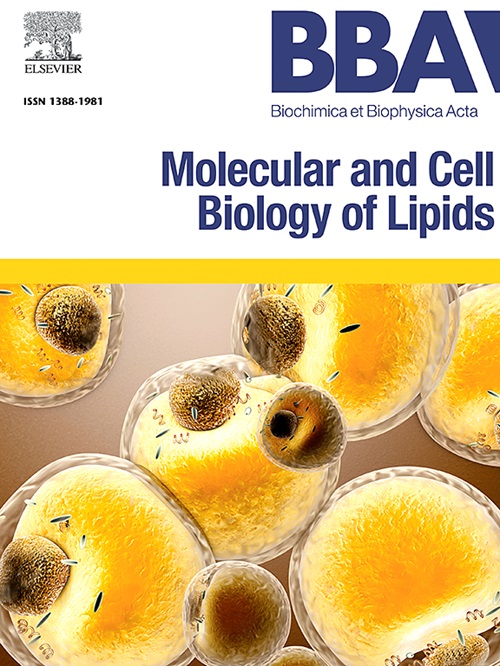紫锥菊苷通过MDM2/PPARγ/ABCA1信号轴抑制巨噬细胞脂质积累,减轻动脉粥样硬化
IF 3.3
2区 生物学
Q2 BIOCHEMISTRY & MOLECULAR BIOLOGY
Biochimica et biophysica acta. Molecular and cell biology of lipids
Pub Date : 2025-08-15
DOI:10.1016/j.bbalip.2025.159681
引用次数: 0
摘要
巨噬细胞胆固醇外排是胆固醇逆向转运的关键步骤,在动脉粥样硬化的衰减中起关键作用。紫锥花苷是一种具有抗炎、抗氧化和抗肿瘤特性的天然化合物,已成为动脉粥样硬化的潜在治疗剂。然而,其抗动脉粥样硬化作用的机制尚不清楚。在这项研究中,我们旨在研究紫锥花苷对巨噬细胞衍生泡沫细胞脂质积累和apoE−/−小鼠动脉粥样硬化进展的影响。我们的主要研究结果表明,紫锥菊苷通过调节MDM2/PPARγ信号传导上调ABCA1表达,增强巨噬细胞胆固醇外排,减少脂质积累。此外,紫锥菊苷可缓解高脂肪饮食喂养的apoE - / -小鼠的动脉粥样硬化进展。MDM2过表达pcDNA3.1-MDM2消除了紫锥菊苷对ABCA1和PPARγ上调、巨噬细胞胆固醇外排和脂质积累的影响。综上所述,紫锥菊苷通过MDM2/PPARγ/ABCA1信号通路抑制巨噬细胞脂质积累,缓解动脉粥样硬化进展。本文章由计算机程序翻译,如有差异,请以英文原文为准。
Echinacoside suppresses macrophage lipid accumulation and attenuates atherosclerosis via the MDM2/PPARγ/ABCA1 signaling axis
Macrophage cholesterol efflux, a critical step in reverse cholesterol transport, plays a pivotal role in the attenuation of atherosclerosis. Echinacoside, a natural compound with anti-inflammatory, antioxidant, and antitumor properties, has emerged as a potential therapeutic agent for atherosclerosis. However, the mechanisms underlying its anti-atherosclerotic effects remain unclear. In this study, we aimed to investigate the effects of echinacoside on lipid accumulation in macrophage-derived foam cells and on atherosclerotic progression in apoE−/− mice. Our key findings indicated that echinacoside upregulated ABCA1 expression, enhanced macrophage cholesterol efflux, and reduced lipid accumulation by modulating MDM2/PPARγ signaling. Additionally, echinacoside alleviated atherosclerotic progression in high-fat diet-fed apoE−/− mice. MDM2 overexpression with pcDNA3.1-MDM2 eliminated the effects of echinacoside on ABCA1 and PPARγ upregulation, macrophage cholesterol efflux, and lipid accumulation. In conclusion, echinacoside inhibits macrophage lipid accumulation and alleviates atherosclerotic progression via the MDM2/PPARγ/ABCA1 signaling pathway.
求助全文
通过发布文献求助,成功后即可免费获取论文全文。
去求助
来源期刊
CiteScore
11.00
自引率
2.10%
发文量
109
审稿时长
53 days
期刊介绍:
BBA Molecular and Cell Biology of Lipids publishes papers on original research dealing with novel aspects of molecular genetics related to the lipidome, the biosynthesis of lipids, the role of lipids in cells and whole organisms, the regulation of lipid metabolism and function, and lipidomics in all organisms. Manuscripts should significantly advance the understanding of the molecular mechanisms underlying biological processes in which lipids are involved. Papers detailing novel methodology must report significant biochemical, molecular, or functional insight in the area of lipids.

 求助内容:
求助内容: 应助结果提醒方式:
应助结果提醒方式:


